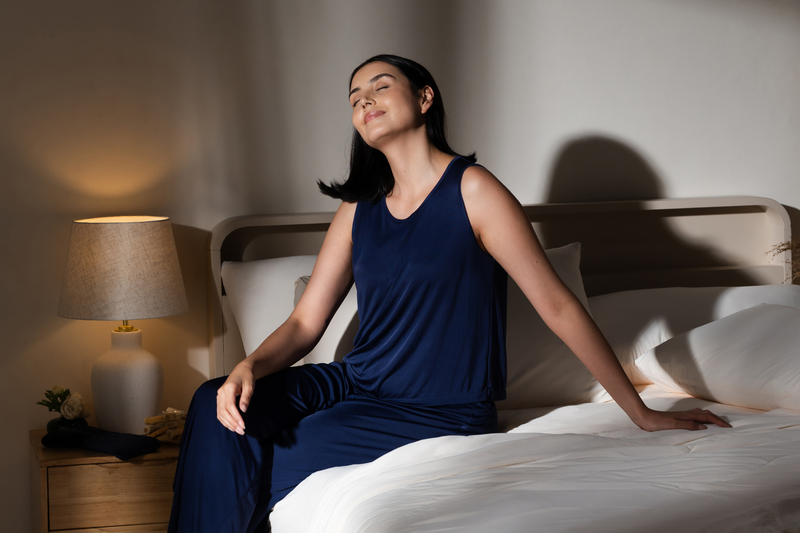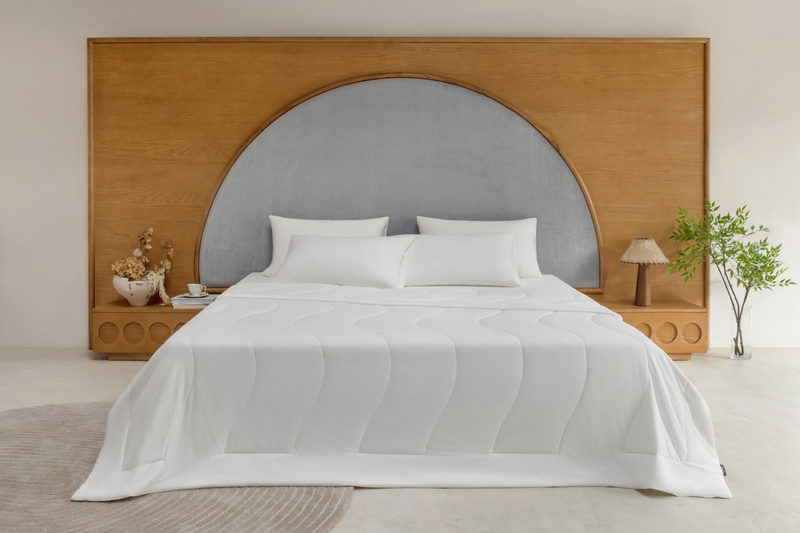What is Sleep Divorce? Sleeping Arrangements for Couples
Sleep Divorce: The Secret to a Better Night’s Rest or a Relationship Red Flag?
TL;DR: A sleep divorce — when couples sleep in separate beds or rooms — can improve rest, reduce conflicts, and support individual sleep needs. While it may raise concerns about intimacy, research shows better sleep often leads to stronger relationships. Alternatives like the Scandinavian Sleep Method, adjustable beds, or separate duvets can also help couples balance rest and connection.
The idea of sharing a bed with your partner is often seen as a fundamental part of a loving relationship. But what happens when that shared bed leads to sleepless nights, frustration, and resentment? In pursuit of better rest, a growing trend may be the solution: sleep divorce.
What Is Sleep Divorce?
Sleep divorce is simply a term to describe couples that choose to sleep in separate beds — or even separate rooms — to improve their quality of sleep. While the term “sleep divorce” may sound severe, this decision focuses on health and optimizing sleep habits, not the indication of relationship issues.
Why Are More Couples Opting for a Sleep Divorce?
In a 2023 study by the American Academy of Sleep Medicine, a third of Americans reported occasionally or regularly sleeping in another bed in the same bedroom or in another space altogether. The modern emphasis on sleep hygiene and personal well-being has encouraged people to prioritize quality sleep.
With rising awareness of sleep disorders like insomnia, restless leg syndrome, and sleep apnea, more couples are acknowledging that a traditional shared bed isn’t always the best option. Additionally, cultural shifts have made it more acceptable to question old norms and adopt habits that work best for individual needs.
Benefits of Sleep Divorce
For some couples, sleeping apart may drastically improve their well-being and even improve relationships as rest is integral for both mental and physical health.
Better Sleep Quality
Snoring, tossing and turning, temperature differences, and mismatched schedules can wreak havoc on sleep. Sleeping separately eliminates these disruptions, leading to deeper and more restorative rest.
Reduced Conflict and Improved Relationship Satisfaction
Quality sleep reduces stress and irritability, helping couples feel more patient, emotionally connected, and appreciative of each other. Surprisingly, some find that sleeping apart strengthens intimacy by eliminating nighttime disruptions that can lead to resentment.
Accommodating Individual Sleep Preferences
Not everyone sleeps the same way. Whether it's needing total darkness, preferring white noise, or requiring a specific mattress firmness, separate sleeping arrangements allow each person to optimize their sleep environment.
Potential Drawbacks of Sleep Divorce
Of course, sleeping separately isn’t for everyone. Co-sleeping extends beyond tradition, with some possible downsides:
Decreased Physical Intimacy
Cuddling, spontaneous intimacy, and morning snuggles can help strengthen emotional bonds. Sharing a bed often facilitates closeness, which might diminish by sleeping apart and reducing these moments, causing feelings of distance.
Potential for Emotional Disconnect
For some, separate sleeping arrangements could lead to emotional disengagement over time. If not managed intentionally, couples might start feeling like roommates rather than romantic partners.
Social Stigma & Misconceptions
Despite growing popularity, social perceptions of couples sleeping separately are often associated with relationship troubles, leading to misunderstandings from peers and family.
Is Sleep Divorce Right for You?
Deciding whether a sleep divorce is the right choice depends on several factors. If you or your partner struggle with:
-
Chronic sleep deprivation due to partner disturbances (eg. tossing and turning)
-
Frequent disagreements over nighttime habits
-
Consistent feelings of fatigue and irritability
-
Different sleep-wake schedules (eg. partners with different alarm times)
-
Conflicting sleep environment requirements (eg. hot plus cold sleeper)
Then a trial period of sleeping separately may be worth considering. Open communication is key—if both partners view it as a mutual decision to enhance sleep, rather than a sign of relationship failure, it can work well.
Is Sleep Divorce Healthy?
Yes, sleep divorce can be a healthy choice for many couples. Research suggests a correlation between relationship quality and sleep; where sleep quality affects relationship satisfaction and vice versa. Poor sleep was linked to higher levels of stress, conflict and relationship dissatisfaction, while healthy relationships promoted better sleep quality. If sleeping separately leads to better rest and less tension, it can actually strengthen a relationship rather than weaken it.
Alternatives to Sleep Divorce
If the idea of separate sleeping spaces feels too extreme or impractical, consider these alternatives:
The Scandinavian Sleep Method
Popular in Nordic countries, this involves sleeping in the same bed but with separate blankets or duvets. This arrangement minimizes movement disturbances and resolves differing temperature preferences as hot sleepers can use a cooling comforter while cold sleepers can opt for a warmer duvet.
Noise & Light Solutions
If snoring or different sleep schedules are an issue, white noise machines, blackout curtains, or even earplugs can help create a more harmonious sleep environment.
Adjustable Beds
Split adjustable beds allow each partner to choose their own mattress firmness and elevation settings without affecting the other person.
Occasional Sleep Separation
Some couples opt for "partial sleep divorce" by sleeping separately a few nights a week or when one partner is sick, stressed, or has an early morning commitment.
Can Sleep Divorce Lead to a Real Divorce?
Not necessarily. While some fear that sleeping apart may signal relationship issues, many couples report feeling happier as sleeping separately reduced sleep-related conflicts. However, if a couple is already struggling with deeper emotional or communication issues, a sleep divorce could amplify those problems rather than solve them. Open discussions and intentional bonding outside the bedroom are key to ensure both partners feel connected and valued.
Is It OK for Married Couples to Sleep Separately?
Absolutely. While traditional norms suggest couples should share a bed, there is no universal rule for what makes a successful marriage. Each relationship is unique and partners should prioritize what works best for their well-being. If separate sleeping arrangements lead to better rest and a happier relationship, then it’s a valid and healthy choice. Some couples adopt this arrangement permanently, while others use it as an occasional solution to restless nights. The key is making sure it’s a mutual decision, not a sign of avoidance or deeper relational problems.
What Cultures Sleep in Separate Beds?
Historically, separate sleeping arrangements have been common in various cultures. For instance, in Victorian England, it was customary for affluent couples to have individual bedrooms. Today, cultures around the world have varying perspectives on shared sleeping arrangements and it's not unusual for couples to sleep apart. In fact, sleeping separately emphasizes the importance of rest and personal space.
-
Japan: Many Japanese couples sleep separately, especially in homes where futons and tatami mats are common. Sleep is seen as a personal activity rather than a shared experience.
-
Scandinavia: Countries like Denmark, Sweden, and Norway commonly practice the Scandinavian sleep method—sharing a bed but using separate covers.
-
China: In some parts of China, it’s not uncommon for older couples to have separate beds or bedrooms, particularly in multi-generational households.
Should You Try a Sleep Divorce?
Sleep is essential to overall health and happiness. If sharing a bed with your partner leads to chronic sleep deprivation, irritation, or frustration, then a sleep divorce could be a game-changer. However, it’s important to communicate openly, set expectations, and ensure that intimacy is maintained in other ways.
For those who aren’t ready for separate beds, alternatives like split bedding, noise solutions, or occasional solo nights can provide a balance between rest and connection. At the end of the day, the best sleep arrangement is the one that keeps both you and your partner happy, well-rested, and emotionally connected.








